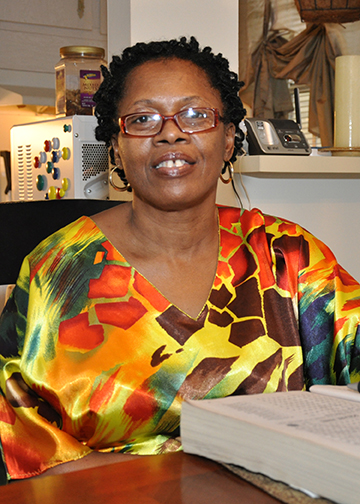
Zettie's story
Persistence after stroke
In November of 2004, Zettie confronted what doctors consider one of the most feared consequences of stroke. When a therapist showed her a photograph of her son, she knew she was looking at her son, but she couldn't say his name.
Zettie, who was 49 years old, was suffering from "expressive aphasia," a language impairment that makes communication difficult. The stroke, which was caused by a blood clot, decreased the oxygen-rich blood supply to the left side of Zettie's brain. Brain cells (neurons) in an "eloquent" area that was responsible for speech and movement died as a result, leaving Zettie temporarily unable to talk or walk.
In the years since, however, something remarkable has happened. Highly motivated, supported by faith, family, friends and physicians – including Donald Carruthers, MD, of Mayfield Brain & Spine -- Zettie has made a comeback. Although her words are not always crystal-clear and her right arm is limp, she is a picture of animation. Her communication is effective and intentional. In 2011 she earned her high school diploma, and this year she began driving again. She lives independently in a small, comfortable apartment that she keeps spotlessly clean with determination, pride and her one good arm.
"After my stroke I didn't know my name. I didn't know how to spell my name," Zettie reflects. "Now I have come all the way back."
Dr. Carruthers, a physical medicine & rehabilitation specialist, first saw Zettie at Good Samaritan Hospital following her stroke. Over the next six years, he continued to oversee her care as she worked to reduce spasticity on her right side and improve her gait. During that time Zettie participated in several clinical trials designed to stretch her capacity to recover, both physically and verbally.
"She had a good attitude from the start," Dr. Carruthers says. "Participating and having a positive attitude will maximize the rehabilitation benefits. Most physicians will say that wherever you are a year out from your stroke, that's where you're going to be. Zettie continued to improve beyond the one-year mark because she persevered, participating in therapy, getting into some studies, trying everything new that she could. Her speech improved; her function improved, too. She was a great patient to take care of, and it was a privilege to participate in her care."
"There are therapies that effect long-term plasticity in the brain, that create new connections in the brain and therefore potentially can have long-lasting effects on aphasia," observes Jerzy Szaflarski, MD, PhD, a neurologist who facilitated Zettie's participation in clinical trials. "As a result, these patients may get better and, thus, return to society and participate in society."
Zettie, who was a smoker with high blood pressure and high cholesterol prior to her stroke, says she was in her third week of hospitalization when her health insurance ran out. At that time, a researcher told her about local studies that explored how various activities might help stroke survivors improve or regain their language or motor skills. Zettie enrolled in a study and never stopped.
Recovery continues daily at home, where Zettie plays solitaire on her computer, solves word puzzles in a large workbook, and works with an aide, "who makes me use my brain when it comes to counting my money and pronouncing words correctly." One neighbor leaves notes on her door so that she can practice her reading every day, and another walks with her through the spacious parking lot outside her apartment. A grateful survivor, she even volunteers at a local hospital.
~ Cindy Starr
Hope Story Disclaimer -"Zettie's Story" is about one patient's health-care experience. Please bear in mind that because every patient is unique, individual patients may respond to treatment in different ways. Results are influenced by many factors and may vary from patient to patient.

"After my stroke I didn't know my name. I didn't know how to spell my name," Zettie reflects. "Now I have come all the way back."
